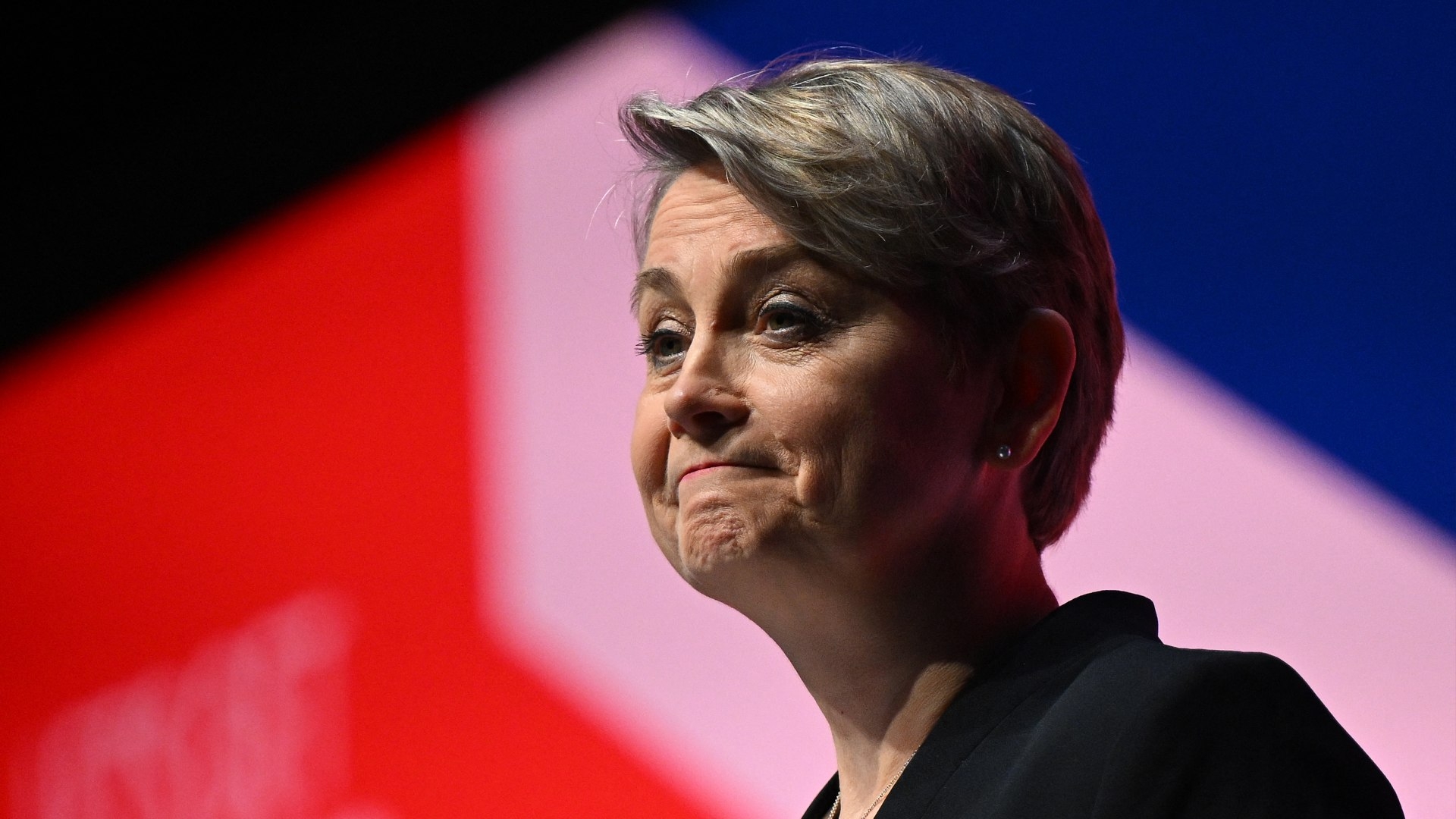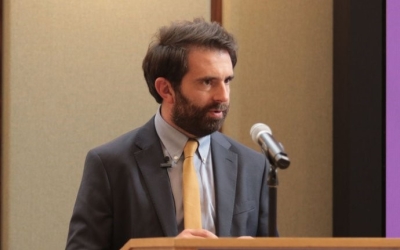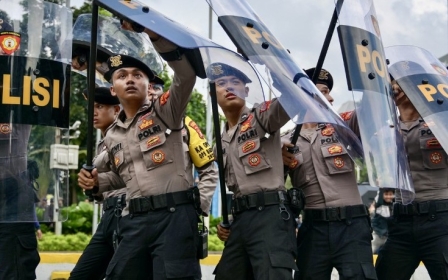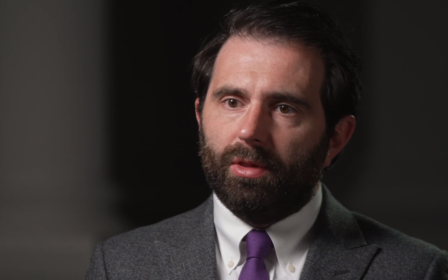UK election 2024: How counter-extremism could be reshaped by a Labour government

The UK general election on 4 July is fast approaching. If the opinion polls are correct and the opposition Labour party sweeps to victory, it could mean significant changes to Britain’s highly controversial counter-extremism policy - which has been widely accused of threatening free speech by leading human rights organisations.
But how would a Labour government change the policy?
The Prevent programme originated under Tony Blair’s Labour government as part of a broader counterterrorism strategy intially created in the aftermath of the 2001 al-Qaeda attacks in the US in 2001 and bolstered after the 2005 attacks on the London transport network in which four bombers killed 52 people as well as themselves.
Initially, the programme, which aims "to stop people from becoming terrorists or supporting terrorism" had an emphasis on community cohesion, and was widely criticised for being ineffective and treating Muslims as a "suspect community", but its focus shifted more overtly to security under the Conservatives after 2010.
In 2015, Prevent became a legal duty for public sector institutions - including hospitals, schools and universities. David Cameron’s government introduced the idea of non-violent extremism, defined as vocal or active opposition to British values.
New MEE newsletter: Jerusalem Dispatch
Sign up to get the latest insights and analysis on Israel-Palestine, alongside Turkey Unpacked and other MEE newsletters
The government tried unsuccessfully - first in 2011 and then in 2015 - to formulate a legally binding definition of extremism. Following this failure, in 2018 Theresa May’s government set up the Commission for Countering Extremism (CCE).
The CCE described itself as providing the government with “impartial, expert advice and scrutiny on the tools, policies and approaches needed to tackle extremism”.
Its first commissioner, Sara Khan, had research papers produced by academics and policy experts and attempted to come up with a working definition of non-violent extremism, which she labelled "hateful extremism".
Under Khan, the CCE expanded the range of counter-extremism to focus not just on Islamist extremism but also on the far right and other ideologies. Khan advocated a “victim-centred approach” to countering extremism.
But this approach was later jettisoned in favour of a new one informed by influential neoconservative think tanks.
Neoconservative approach
An independent review of Prevent, which rights groups had long campaigned for, came about in early 2019 as a result of a House of Lords amendment to the Theresa May government's controversial Counter-Terrorism and Border Security Bill.
It was initially welcomed by critics of Prevent who saw it as an opportunity for real scrutiny of the strategy's failings.
In August 2019, the government appointed Lord Carlile as lead reviewer. But he stood down in the face of a legal challenge, after it emerged that he had described the review as "completely unnecessary, based on fictitious or complete lack of evidence" and said he had "played a part" in Prevent and might be "somewhat biased".

The post of reviewer then remained unfilled until 2021 when Boris Johnson’s government appointed William Shawcross - a former director of the Henry Jackson Society think tank with his own record of making controversial remarks about Muslims - to review Prevent.
Shawcross's record led to rights groups and prominent Muslim organisations boycotting the process.
His report, published in 2023, called for Prevent to prioritise the threat from Islamist extremism over far-right extremism, arguing that confronting Islamist narratives should be a “principal component of Prevent activity”.
He said that while not all Islamists are violent, the "Islamist worldview poses challenges for liberal societies beyond the confines of counterterrorism".
The government accepted Shawcross's recommendations. His views accorded with those of Sara Khan's successor at the Commission for Countering Extremism, Robin Simcox, who had a record of working for think tanks accused of Islamophobia - including the Henry Jackson Society.
Simcox, who shares Shawcross’s focus on “Islamist extremism”, was initially appointed interim commissioner in March 2021 under the then home secretary, Priti Patel, and later confirmed in the role by her successor, Suella Braverman, in July 2022.
Simcox's appointment marked the start of a shift away from Khan's approach.
After Shawcross's review, the CCE was empowered to designate organisations and groups as extremist - for the purpose of vetting them for government engagement.
According to its own founding charter, the commission did not have any remit on counterterrorism policies, including Prevent. But this charter was withdrawn in July 2023 and the CCE appears to have been operating without one since.
'Having a clear definition for extremism would allow [the government] to be challenged by individuals and organisations currently smeared by it'
- Layla Aitlhadj, Prevent Watch
In February 2024, critics accused the British government of attempting to shield Prevent from accountability when it launched a new Standards and Compliance Unit within the CCE to handle complaints about the programme.
The creation of the unit means that complaints about the programme are handled by the same body that is overseeing its delivery.
Then, in March this year, Communities Secretary Michael Gove introduced a new - though not legally binding - definition of extremism: “the promotion or advancement of an ideology based on violence, hatred or intolerance that aims to: negate or destroy the fundamental rights and freedoms of others; undermine, overturn or replace the UK’s system of liberal parliamentary democracy and democratic rights; or intentionally create a permissive environment for others to achieve those results.”
Ilyas Nagdee, Amnesty International UK's racial justice director, told Middle East Eye that the definition would "shrink the space for legitimate dissenting views and the right to protest", and that the next government should "roll back" on it and abolish Prevent.
'Hateful extremism'
Dr Layla Aitlhadj, director of Prevent Watch, told MEE that "Labour's manifesto is silent on Prevent and counterterrorism, which implies no immediate change".
But the party appears to have signalled that it will move away from the Shawcross-Simcox approach and return to something more in line with the approach advocated for by Khan - but going further than Theresa May's government did.
Khan remains an influential figure and has continued to advise Gove’s department on extremism as the government’s Independent Adviser for Social Cohesion and Resilience.
In a BBC interview last year she implicitly criticised the new approach to extremism promoted by Shawcross and said it should be “ideologically blind”.
Labour’s shadow home secretary, Yvette Cooper, a former chair of the home affairs select committee, appears to support Khan's approach and has repeatedly used her term "hateful extremism".
In February 2023, Cooper responded to the Shawcross review by saying Prevent was “extremely important” but that there “should be no hierarchy of extremism”. She called for a broader counter-extremism strategy to fight “hateful extremism”.
Then in July last year Cooper gave a speech to the Royal United Services Institute calling on the government to "tackle hateful extremism" and recognise "the importance of neighbourhood policing to counterterrorism work" - which appeared to double down on Prevent.
And in November, Cooper cited proposals by Khan and Metropolitan Police Commissioner Mark Rowley for new laws to be introduced to combat “hateful extremism” by closing a “gaping chasm” in legislation that allows “extremists” to operate with “impunity”.
Khan was concerned that people glorifying Hamas (a crime under UK law) were avoiding prosecution by avoiding directly supporting the organisation.
Significantly, though, in March 2024 Labour did not oppose Michael Gove’s new definition of extremism. In parliament, the party’s deputy leader, Angela Rayner, accepted that the government should vet individuals and groups for extremism.
She criticised the government for ministers having previously engaged with groups Gove said were extremist, and repeated Cooper’s call for a new cross-government counter-extremism strategy.
In early April the party cut ties with Muslim Engagement and Development (Mend), one of the UK's most prominent Muslim organisations, after Gove said the group would be investigated for extremism.
Mend's activities include community outreach programmes, educational workshops, and campaigns aimed at raising awareness about Islamophobia. At least half a dozen Labour politicians have previously attended Mend events.
This move suggests Labour could accept the extremist designations brought in by the government. That would mean that at least part of the neoconservative agenda favoured by Shawcross and Simcox could remain in place under Labour.
Defining extremism
The Labour party’s election manifesto promises to "update the rules around counter-extremism, including online, to stop people being radicalised and drawn towards hateful ideologies".
The term “hateful ideologies” gestures to Khan’s approach, while the reference to “rules” rather than laws could suggest Labour has no plans to try and succeed where the Conservatives could not in formulating a legally binding definition of extremism.
MEE asked Labour whether it planned to retain Gove's definition of extremism, and to expand on its own plans for countering extremism, but had not received a response at the time of publication.
'This could prove to be a legal nightmare for Labour, exposing them to numerous challenges and complications'
- Layla Aitlhadj, Prevent Watch
Aitlhadj of Prevent Watch told MEE she thought it unlikely that a Labour government would seek to legally define extremism. "Having a clear definition for extremism would allow [the government] to be challenged by individuals and organisations currently smeared by it.
"This could prove to be a legal nightmare for Labour, exposing them to numerous challenges and complications."
Jacob Smith, UK accountability team leader at Rights and Security International, said that "regardless of whether it decides to define the word, any new government must avoid politicising 'extremism'.
"Just because someone holds an opinion that the government disagrees with, does not mean that they should be surveilled or deplatformed."
Smith said any new government should replace Prevent with a strategy focused "on the prevention of violence, not policing people's lawfully held thoughts or opinions".
Aitlhadj believes that Prevent should be scrapped by the incoming government, with its funding diverted instead towards less contentious and divisive initiatives: "They should redirect the resources towards youth services and community initiatives that truly foster social cohesion and resilience without securitisation."
Middle East Eye delivers independent and unrivalled coverage and analysis of the Middle East, North Africa and beyond. To learn more about republishing this content and the associated fees, please fill out this form. More about MEE can be found here.





